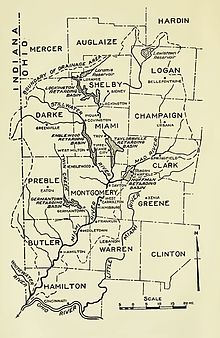Miami Valley

The Miami Valley is the land area surrounding the Great Miami River in southwest Ohio, USA, and includes the Little Miami, Mad, and Stillwater rivers as well. Geographically, it includes Dayton, Springfield, Middletown, Hamilton, and other communities. The name is derived from the Miami Indians.[1]
Commonly, however, it refers to the economic and cultural-social region centered on the Greater Dayton area [citation needed]. Middletown and Hamilton both fall under the economic and cultural-social influence of Cincinnati and thus are not commonly included in this sense. Institutions and enterprises in the Dayton area, such as Miami Valley Career Technology Center, Miami Valley Hospital, Miami Valley Young Marines,[2] Miami Valley Council of the Boy Scouts of America and Miami Valley Storytellers illustrate local usage.

History
[edit]During the mid-twentieth century, among the largest employers in the Valley were Procter & Gamble in Cincinnati, Champion Paper and Fiber in Hamilton, Armco in Middletown, and National Cash Register in Dayton.[3]
Counties and cities
[edit]Local television stations WDTN, ThinkTV (WPTD and WPTO), WHIO-TV, WKEF and WRGT include the following counties and cities in the cultural Miami Valley:
- Montgomery County (Dayton)
- Greene County (Xenia)
- Preble County (Eaton)
- Clark County (Springfield)
- Miami County (Troy)
- Darke County (Greenville)
- Champaign County (Urbana)
- Shelby County (Sidney)
- Logan County (Bellefontaine)
- Butler County (Hamilton)
- Warren County (Lebanon)
- Wayne County, Indiana (Richmond)
- Mercer County (Celina)
- Auglaize County (Wapakoneta)
Additionally, WHIO includes the following locations in its news and weather coverage:
Transportation
[edit]Transit
[edit]- Butler County Regional Transit Authority - Primarily serves Hamilton, Middletown and Oxford
- Greater Dayton Regional Transit Authority
- Greene CATS Public Transit - Serves Xenia
- Rose View Transit - Serves Richmond, IN
- Springfield City Area Transit
Major highways
[edit]- Interstate 75 - Runs north to south along the valley and through downtown Dayton.
- Interstate 70 - Traverses the valley from east to west.
- Interstate 71 - Runs north to south along the eastern half of the Miami Valley.
- Interstate 675 - Bypasses Dayton from I-75 south of the city to I-70 east of it.
- U.S. Route 35 - Runs east to west through the Dayton metro area.
- U.S. Route 68 - Runs north to south through farmlands in the eastern Miami Valley.
- U.S. Route 127 - Runs north to south through several cities and rural communities in the western Miami Valley.
- Ohio State Route 129 - Connects Hamilton to I-75.
- Ohio State Route 49 - Forms a bypass west of Dayton and continues north into Darke County.
Demographics
[edit]As Greater Cincinnati grows northward through Butler County, it could conceivably merge with Greater Dayton by 2030, thereby virtually erasing any boundary between the two current Combined Statistical Areas (CSA). As a result, the US Census Bureau could begin reporting the Cincinnati and Dayton metropolitan areas as one by that time, though it would be up to the U.S. Office of Management and Budget to make the merger decision. The new Cincinnati–Dayton metropolitan area would be comparable in size to that of the Orlando–Deltona–Daytona Beach, FL CSA and place it within the top 20 most populous metros in the US, with a population of nearly 3.0 million.[4]
See also
[edit]References
[edit]- ^ Drury, Augustus Waldo (1909). History of the City of Dayton and Montgomery County, Ohio, Volume 1. S. J. Clarke Publishing Company. p. 57.
- ^ Marines, Miami Valley Young. "Miami Valley Young Marines". Miami Valley Young Marines. Retrieved 2022-07-23.
- ^ Vance, J.D. (2001). Hillbilly Elegy. New York City: HarperCollins. p. 53. ISBN 978-0-06-230054-6.
- ^ A combined Cincinnati-Dayton metropolitan comes closer to reality
Further reading
[edit]- Sealander, Judith. Grand Plans: Business Progressivism and Social Change in Ohio's Miami Valley, 1890-1929 (1988) excerpt
- Regions of Ohio
- Valleys of Ohio
- Landforms of Montgomery County, Ohio
- Landforms of Greene County, Ohio
- Landforms of Preble County, Ohio
- Landforms of Clark County, Ohio
- Landforms of Miami County, Ohio
- Landforms of Darke County, Ohio
- Landforms of Champaign County, Ohio
- Landforms of Shelby County, Ohio
- Landforms of Logan County, Ohio
- Landforms of Butler County, Ohio
- Landforms of Warren County, Ohio
- Landforms of Wayne County, Indiana
